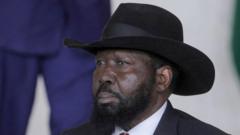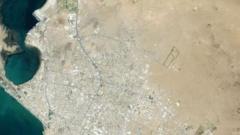In a significant shift aimed at resolving a diplomatic spat, South Sudan has announced it will permit the entry of a man previously deported from the United States. This decision follows a tense exchange between the two nations regarding visa revocation and citizen deportations.
South Sudan Accepts Deportee from U.S. Amid Rising Visa Tensions

South Sudan Accepts Deportee from U.S. Amid Rising Visa Tensions
In an effort to ease diplomatic tensions, South Sudan agrees to accept a deported man from the U.S., reversing its earlier stance.
South Sudan's government, led by President Salva Kiir, initially opposed the deportation, asserting the man was misidentified as a South Sudanese national. This controversy escalated when U.S. Secretary of State Marco Rubio imposed a visa ban on all South Sudanese citizens in response to the country's refusal to accept repatriated individuals.
On Tuesday, South Sudan's foreign ministry declared that the individual in question, now identified as a citizen of the Democratic Republic of Congo, would be welcomed back "in the spirit of friendly relations." The government indicated arrangements were being made for his arrival in Juba within days.
The earlier U.S. visa restrictions represented a notable departure from standard diplomatic practices, marking the first time since the Trump administration that such actions targeted all citizens of a single country. Rubio attributed this decision to South Sudan’s inadequate response to the repatriation of its nationals, calling for full cooperation moving forward.
Meanwhile, South Sudan's government expressed regret for the sweeping sanctions, labeling them an overreaction rooted in a singular incident involving miscommunication. Deputy Secretary of State Christopher Landau, however, dismissed this contention, emphasizing the importance of adhering to diplomatic representations.
The backdrop of this dispute is further complicated by increasing unrest in South Sudan, as fears grow regarding potential resurgence in civil conflict. The political situation has become more volatile following the house arrest of First Vice-President Riek Machar, amid accusations of fomenting rebellion against Kiir's leadership.
Moreover, emerging from the U.S. administration's earlier decisions, many South Sudanese previously benefited from Temporary Protected Status, which permitted them to remain stateside amid ongoing turmoil at home. However, this protection is set to expire, raising further concerns among the diaspora community.
As tensions persist, the unfolding events encapsulate the fragility of South Sudan’s political landscape and the complexities surrounding international diplomatic relations.
On Tuesday, South Sudan's foreign ministry declared that the individual in question, now identified as a citizen of the Democratic Republic of Congo, would be welcomed back "in the spirit of friendly relations." The government indicated arrangements were being made for his arrival in Juba within days.
The earlier U.S. visa restrictions represented a notable departure from standard diplomatic practices, marking the first time since the Trump administration that such actions targeted all citizens of a single country. Rubio attributed this decision to South Sudan’s inadequate response to the repatriation of its nationals, calling for full cooperation moving forward.
Meanwhile, South Sudan's government expressed regret for the sweeping sanctions, labeling them an overreaction rooted in a singular incident involving miscommunication. Deputy Secretary of State Christopher Landau, however, dismissed this contention, emphasizing the importance of adhering to diplomatic representations.
The backdrop of this dispute is further complicated by increasing unrest in South Sudan, as fears grow regarding potential resurgence in civil conflict. The political situation has become more volatile following the house arrest of First Vice-President Riek Machar, amid accusations of fomenting rebellion against Kiir's leadership.
Moreover, emerging from the U.S. administration's earlier decisions, many South Sudanese previously benefited from Temporary Protected Status, which permitted them to remain stateside amid ongoing turmoil at home. However, this protection is set to expire, raising further concerns among the diaspora community.
As tensions persist, the unfolding events encapsulate the fragility of South Sudan’s political landscape and the complexities surrounding international diplomatic relations.





















